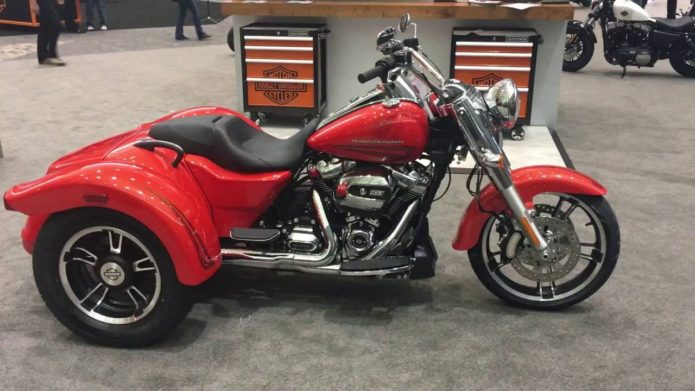American riders have had a love affair with the Harley trike ever since the original Servi-Car hit the streets all the way back in 1932, and that’s a fling that Harley-Davidson is still trying to take to the bank with the 2017 Freewheeler. This newest iteration of their naked trike is a real hotrod that runs the all-new Milwaukee-Eight107 engine that cranks out 100-plus pound-feet of torque to push it well into the power-cruiser bracket. It comes with some significant improvements over last year’s Freewheeler as well as some fairly major structural differences with the tour-tastic Tri Glide Ultra, so let’s see what else Harley packed onto its stoplight-burning trike.
Design
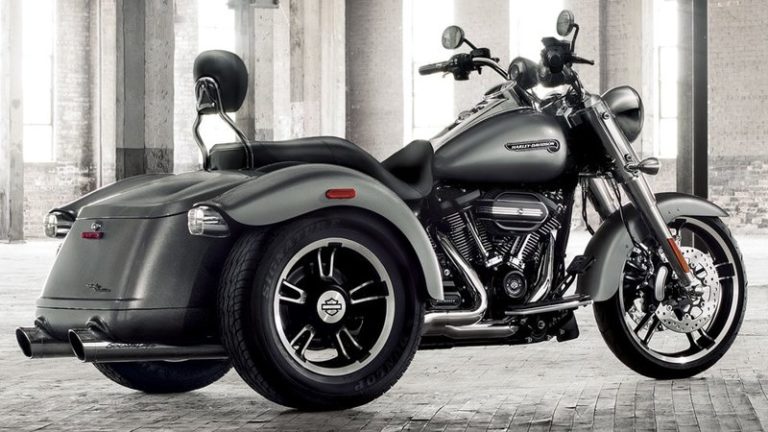
Harley had to look no further than its own history for influences to come up with the overall look of the Freewheeler. First, we have the obvious connection to the Servi-Car trike that saw production from 1932 up until 1975. The fat front forks and chrome, beer-can covers hail back to the early days of hydraulic front suspension, but the front fender is pared down much further than you’d expect on such a beefy front end, and that steers the look into custom country.
Instrumentation is rather basic with a single clock for the speedometer/odometer/tach and a handful of idiot lights set with the ignition switch in the typical console Harley uses with all its split-tank units. I gotta say I’ve never been a fan of this feature; the glare of the sun bouncing up under my shades are like needles in my eyes, and even the colored dash inserts in the aren’t enough to sufficiently tame all the hotspots.
The deep-scoop seat rests at 27.5 inches off the ground at its lowest point before it rises to the pillion pad, but this is clearly meant to be a one-up machine judging by the tapered, almost vestigial, passenger seat. Sure, there’s a pair of oh shit handles, but it won’t be comfortable to rely on one’s own grip to stay aboard the thing for very long.
Bobbed fenders carry the tail lights up under the swoop for a super-clean rear end, and the box in between provides two cubic-feet of dry storage, which is just about enough for a couple of full-face helmets with room left over for some gear as well. That’s enough for some solo touring or maybe some grocery runs, but you’ll want to look at a Tri Glide if you fancy two-up riding or any kind of long-distance work.
Chassis
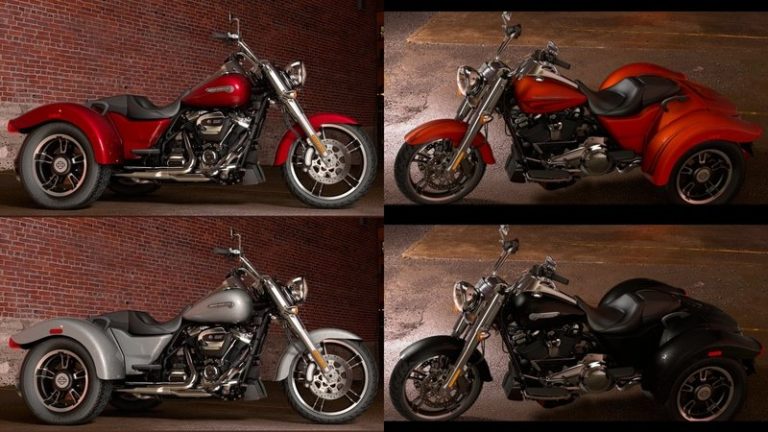
Frame design is built from the ground up to be a trike; the factory didn’t simply repurpose and adjust an existing frame for the Freewheeler. This gives the trike a structure that is specifically designed to withstand the unusual forces generated when trying to corner one of these old-school three wheelers.
As special as the frame is, it has the same mild tubular steel construction as the rest of Harley’s lineup. The 49 mm front forks ride with only 26 degrees of rake, and that gives the 19-inch front wheel a total of 3.96 inches of trail and a 65.7-inch wheelbase. Wide rear tires put the power to the pavement with a pair of 205/65 R15 hoops on the cast-aluminum “Enforcer” rims, and herein lies the Freewheeler’s greatest strength; the ability to really use all that torque for acceleration due to the stability and traction of the dual rear wheels.
Dual front brakes come linked to the rear caliper with Harley’s Linked-Brake feature that applies a portion of the rear brake effort to the front calipers for balanced braking and safer stops. A foot-actuated parking brake completes the package with easy operation and confident parking, even on a grade.
Drivetrain
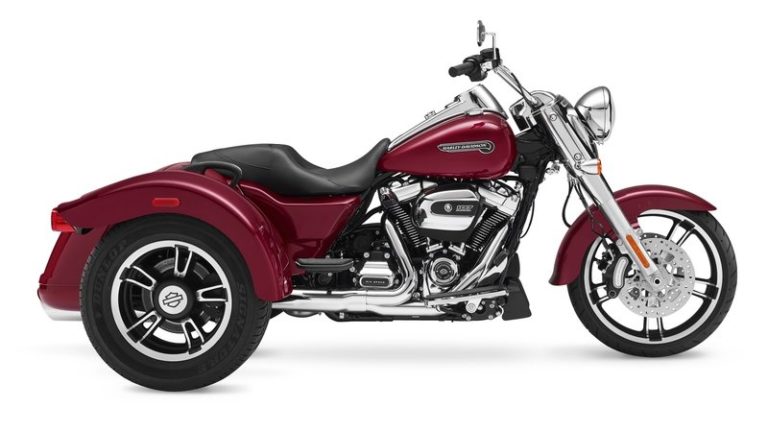
The star of the show, and the biggest upgrade for this year, would have to be the all-new Milwaukee-Eight engine. This is Harley’s coolest-running engine to date, mainly due to the targeted oil cooling within the big V-Twin that hits the hottest spots such as near the exhaust-valve guide and the bottoms of the piston crowns. Exhaust components got rearranged this year to move the hot catalytic converter further away from any potential passenger you may be entertaining, so the gains by the oil cooling are not lost on the passenger.
As usual, the mill runs a long-stroke configuration with a 100 mm bore and 111.1 mm stroke for a total displacement of 1,746 cc with a 10-to-1 compression ratio. Equally typical of the brand are the external pushrods that actuate the quad-valve heads, and I, for one, am glad to see the factory moving back to a single-cam setup.
An electronic fuel-injection system delivers a combined mileage rating of 43 mpg with 110.6 pound-feet of torque that comes on fully by 3,500 rpm. The six-speed transmission gives you a reasonably relaxed rpm at cruising speeds, but only downshift once and you have a strong, fifth-gear roll-on for making passes with authority.
This newest mill still has that good old Harley lope, but due to clever counterbalancers in the engine, the old Harley shake has been tamed to a shadow of its former self, be that for good or ill. I think it’s fine and dandy tuned down a bit, ’cause I regularly ride far enough for the vibration to put my hands to sleep and I would really prefer that they didn’t, but purists complain the engineers went too far. Oh well, can’t make everybody happy all the time.
Price
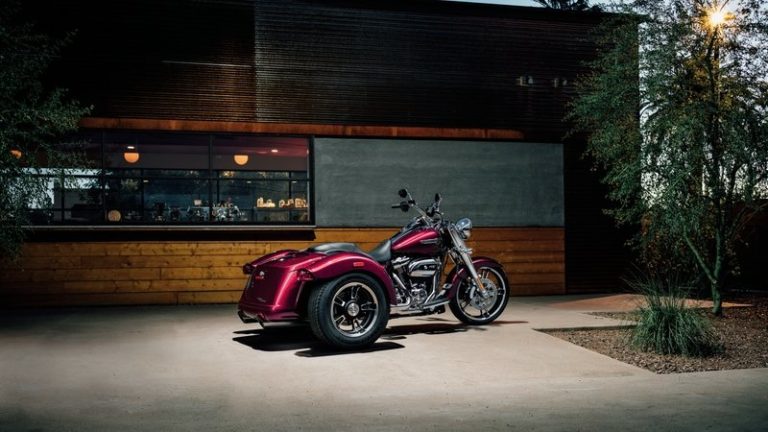
As usual, price depends on your choice of paint. The Vivid Black sheet metal will set you back $26,339, and the color package will bump that on up to $26,839. At the top end, the Custom Color package goes for $27,939 and it includes the new-for-2017 Laguna Orange for a little unique flair.
Competitor
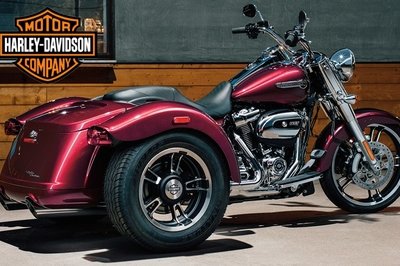
It’s near impossible to find a true, apples-to-apples competitor for this old-school trike, but there are plenty of kinda-close rides that might appeal to the same sort of rider, and my favorite of the available choices is none other than the Spyder F3 by Can-Am. The Delta-trike movement is in full swing, but how does it compare to the standard style? Well, it almost feels like you’re driving a car, or one of them fandangled Slingshot contraptions from Polaris engines are top-notch as well. Oh and, I don’t trust the old-style trikes; I’ve seen what happens when they roll over in a turn…”
She Said
My wife and fellow motorcycle writer, Allyn Hinton, says, “I like the trikes; three wheels appeals to me, be they two in the front or two in the rear. On the Freewheeler, I think I’d have to go for a windscreen since I feel perched up high and get all the wind. The downside is you can’t lean, so taking corners and curves takes some getting used to. It certainly is a different riding style than two wheels or two wheels up front. The upside is, the Freewheeler, even though it is more hot rod than tourer, is a dream on the highway: comfortable and capable. Even at highway speeds, it still has plenty more to give, so roll-on is no problem. This is a machine that was seriously built for the open road. I know that sounds cliche, but it is true.”
Specifications
| ENGINE: | |
| Engine: | Milwaukee-Eight™ 107 engine |
| Valves: | Pushrod-operated, overhead valves with hydraulic, self-adjusting lifters; two valves per cylinder |
| Bore x Stroke: | 3.87 in. x 4.375 in. (100 mm x 111.1 mm) |
| Displacement: | 107 cu. in. (1746 cc) |
| Compression Ratio: | 10.0:1 |
| Fuel System: | Electronic Sequential Port Fuel Injection (ESPFI) |
| Air Cleaner: | Paper, washable |
| Lubrication System: | Pressurized, dry-sump with fan-assisted oil cooler |
| DRIVETRAIN: | |
| Primary Drive: | Chain, 34/46 ratio |
| Final Drive: | Belt, 30/70 ratio |
| Clutch: | Hydraulically actuated multi-plate wet, Assist & Slip |
| Transmission: | 6-Speed Cruise Drive® |
| Gear Ratios (overall) U.S.: | |
| 1st: | 10.534 |
| 2nd: | 7.302 |
| 3rd: | 5.423 |
| 4th: | 4.392 |
| 5th: | 3.741 |
| 6th: | 3.157 |
| PERFORMANCE: | |
| Engine Torque (per J1349) North America: | 110.6 ft. lb. @ 3500 RPM (150 Nm @ 3500 RPM) |
| Fuel Economy (Combined City/Hwy): | 39 mpg (6 L/100 km) |
| CHASSIS: | |
| Frame: | Mild steel, square-section backbone with twin downtubes |
| Swingarm: | Mild steel, rectangular tube sections with plate junctions; MIG welded |
| Front Forks: | 49 mm telescopic |
| Rear Shocks: | Air-adjustable |
| Wheels: | Enforcer Cast Aluminum |
| Front Wheel: | 19 in. x 3.5 in. (483 mm x 89 mm) |
| Rear Wheel: | 15 in. x 5.5 in. (381 mm x 140 mm) |
| Brakes: | |
| Caliper Type: | 6 piston fixed front with 4-31.75 mm front pistons and 2-25.4 mm linked rear pistons, 31.75 mm single piston floating rear |
| Rotor Type: | Dual floating rotors (front), fixed rotor (rear) |
| Front Rotors: | 11.81 in. x .2 in. (300 mm x 5.1 mm) |
| Rear Rotor: | 10.66 in. x .25 in. (270.8 mm x 6.4 mm) |
| Suspension Travel: | Front Wheel: 4.6 in. (117 mm), Rear Wheel: 3 in. (76 mm) |
| Tires: | (Dunlop® Harley-Davidson® Series, bias blackwall front and radial blackwall rear) |
| Front Tire: | D408F MT 130/60B19 M/C 61H |
| Rear Tire: | Signature P205/65R15 |
| Parking Brake: | Foot actuated dual parking brake |
| DIMENSIONS & CAPACITIES: | |
| Length: | 103.3 in. (2625 mm) |
| Overall Width: | 55.2 in. (1401 mm) |
| Overall Height: | 45.5 in. (1155 mm) |
| Seat Height: | Laden: 26.2 in. (665 mm), Unladen: 27.5 in. (699 mm) |
| Ground Clearance: | 5 in. (127 mm) |
| Rake (steering head): | 26° |
| Fork Angle: | 32.2° |
| Trail: | 3.96 in. (101 mm) |
| Wheelbase: | 65.7 in. (1670 mm) |
| Fuel Capacity: | 6 gal. (22.7 L) (warning light at approximately 1.0 gal.) |
| Oil Capacity (w/filter): | 5.2 qt. (4.9 L) |
| Transmission Capacity: | 1 qt. (.95 L) |
| Primary Chain Case Capacity: | 1.1 qt. (1 L) |
| Weight: | |
| As Shipped: | 1062 lb. (482 kg) |
| In Running Order: | 1096 lb. (497 kg) |
| Gross Vehicle Weight Rating : | 1700 lb. (771 kg) |
| Gross Axle Weight Rating: | Front: 512 lb. (232 kg), Rear: 1200 lb. (544 kg) |
| Luggage Capacity: | 2 cu. ft. (0.06 m3) |
| ELECTRIC: | |
| Battery (per Battery Council International Rating): | Sealed, maintenance-free, 12V, 28-amp/hour, 405 cca |
| Charging: | Three-phase, 48-amp system (600W @ 13V, 2000 RPM, 625W max power @ 13V) |
| Starting: | 1.6 kW electric with solenoid shift starter motor engagement |
| Lights (as per country regulation): | |
| Headlamp (Quartz Halogen): | 55-watt low beam, 50-watt high beam |
| Tail/Stop Lights: | Two @ 8W/28W |
| Front Signal Lights: | 8W/28W |
| Indicator Lamps: | High beam, running lights, battery, neutral, low oil pressure, engine diagnostics, cruise control, security system (optional), gear indicator, low fuel warning, reverse, park brake, miles to empty |
| Gauges: | Large speedometer and tachometer with wide numbers; large fuel and volt gauges with wide numbers; display features odometer, trip A, trip B, range to empty, and gear indicator; and larger telltale indicators, including new reverse indicator light |
| Reverse Gear: | Electric reverse actuated by handlebar mounted hand controls |
| DETAILS: | |
| Warranty: | 24 months (unlimited mileage) |
| Colors: | Vivid Black, Black Quartz, Billet Silver, Velocity Red Sunglo, Laguna Orange |
| Price: | $26,339, Color: $26,839, Custom Color: $27,939 |
(topspeed.com, https://goo.gl/Pb2QuF)


